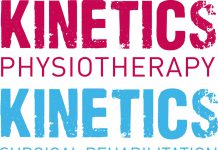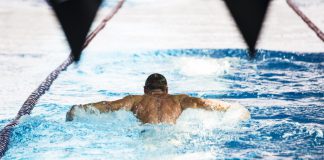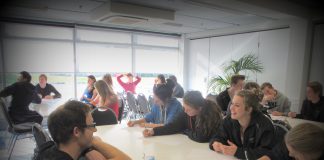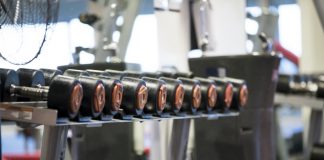“No one ever achieved anything great by staying inside their comfort zone.”
These words have always spurred William Pike, even before the accident which changed the course of his life.
In 2007, William was just beginning his teaching career at Clevedon School, balancing work with his love of outdoor adventuring. At 22, he was an experienced mountaineer and took a friend with him to climb Mt Ruapehu. After the pair settled in for the evening at Dome Shelter, by the crater lake, the mountain erupted without warning. William was critically injured, pinned by volcanic mud and rocks. As his mate ran down the mountain for help, William was left falling in and out of consciousness, but fully aware of the severity of his situation.
This isn’t a story of William’s accident and recovery – he’s written a book about that himself. This is a story of resilience and increased appreciation for what’s possible in life. How losing a leg, but not losing your life, can set you on a path you’d never imagined possible. Following nine weeks in hospital, a below-the-knee amputation and a long rehabilitation process, including learning to walk with a prosthetic, William set small movement and life goals and went about ticking them off. “I wanted to learn to walk and get back in the classroom, and that took a couple of years to back into,” he recalls.
North Shore born and bred, William had returned to teaching at Murrays Bay Primary when he got the phone call which would change his career by integrating two of his great passions. His Ruapheu story and subsequent recovery had been covered in the media, and a school from the Taupo region had taken great interest. “They approached me to help them set up a youth development programme, and I was more than happy to help out and give back to the community,” William says. The concept took a year to develop before the school dropped their key idea. “They asked me if I would mind it being named after me, and I thought that was pretty cool, but also it sounded a little weird having something named after yourself,” he laughs. “I thought it was just going to be that school, so I didn’t think too much about it, and the William Pike Challenge was born.”
He returned to teaching, publishing an article about his experience in the Education Gazette which saw his phone ringing non-stop. Word spread about the Challenge and impact it was having in the Taupo school, and William was inspired to see how many more children could benefit from being involved. “I could see the perfect combination of outdoor activity and education, and it was something I was just so passionate about,” he tells. “In 2013, I took a big leap outside my comfort zone, left teaching and spent the following few years laying the foundation for the nation-wide William Pike Challenge.”

The William Pike Challenge (WPC) is a structured and specialist youth development programme which promotes 21st century skills in young people aged 11-14. Students complete three branches of the Challenge, including outdoor adventures, community service and passion projects. Now in almost 100 schools across the country, nearly 10,000 young Kiwis have completed the Challenge. William’s role is the Managing Director, overseeing the high level strategic vision of the William Pike Challenge. He’s currently working towards setting up an advisory board, ensuring external input helps the programme’s longevity with the goal of reaching 200 school in the next 2 years His teaching background has helped align the programme with the national curriculum. “Education outside the classroom is an essential part of school life, but there is no fixed programme for it,” William explains. “I could see a gap there in the upper primary and intermediate level where these kids could really benefit from learning outside the classroom.” The key competencies and 21st century skills developed during the WPC sit within the curriculum and will also hold children in good stead in an uncertain future working world. “These kids are going to face some quite significant challenges and changes, and the more comfortable and capable they are in stepping outside their comfort zone, the better off they’ll be,” William tells.
Problem solving, resilience, critical thinking and goal setting are all developed through the programme, which also gives students the opportunity to follow something they’re personally invested in. The Passion Projects have brought William some of his favourite stories. “We had a girl who helped out at St Johns, and progressed through the ranks to volunteer at events, and she loved it so much she’s now pursuing medicine as a career,” William shares. “Another student made little beanies for premature babies at Starship Hospital. It’s really cool to know that these are off-shoots of their involvement in the programme.”

While speaking to corporates, visiting schools and directing the business aspects of the WPC keeps William busy, he does still enjoy adventuring. Since his accident, he had continued to climb mountains and undertake ambitious journeys. He was part of a four-person team to climb Mt Scott in Antarctica, a project aiming to showcase the beauty of the Antarctic region. “It was something which had been on my list since I was 12,” he recalls. “One of my real passions is photography, so I was capturing the trip. It took us 18 hours and was no small risk, but it was one of the most exceptional journeys of my life.”
For these trips, it’s important that William maintains his fitness and strength. AUT Millennium has been part of William’s life since he was in high school, having been a keen water polo player and swimmer. Following his accident, he found being back in the pool beneficial for his mental health as well as physical condition. While he had a background of swim fitness and sound technique, most of that was lost following his hospital stay, requiring him to start from scratch. “It was pretty much the first exercise I did after my accident,” he recalls. “It was probably a couple of months after leaving hospital that I decided to get back into the pool and orientate myself again. It was a great way of exercising and not having to worry about my leg.”
Now, he’s a gym member who works out as often as his schedule will allow. “In a regular week, I’m probably in the pool two or three times a week, and a couple of times in the gym,” he says. “I found there were some activities I didn’t have the right level of strength for, and I think the gym training is making a fair bit of difference. I’m not trying to come out with He-Man strength, I just want that functional strength and to maintain muscle in my leg and keep fit.” He’s thankful to have had the opportunity to have health and fitness play a vital role in his life. “I’ve been coming here for a big part of my life, and I’m sure my daughter will come here as well. I’m exceptionally grateful to be a member here, and in turn, it’s helped me achieve some very big milestones.”
Continuing to push himself personally, physically and professionally is a high priority for William. It’s something he continues to allow to drive life decisions, his latest avenue was joining the Institute of Directors and being appointed to the Antarctic Heritage Trust. “I was in high school when I realised that by stepping outside my comfort zone, I could achieve some incredible things and have amazing experiences,” he tells. “The skills I developed by learning to step outside my comfort zone was the number one key to my success in overcoming the challenges I faced following the accident.”
No matter where his sense of adventure and willingness to explore takes him, he’s committed to the William Pike Challenge, wanting to increase the number of Kiwi kids developing key life skills through outdoor education and community service. “Youth development and education are both real passions of mine,” he tells. “I continue to learn on the business side of things, but I’m definitely in this for the long haul. I want the programme to outlive me and grow exponentially around the country.”
How to support the William Pike Challenge
Schools pay for a licence to run the programme for their students, but there are some schools and regions for whom this isn’t viable. William has worked with businesses who sponsor a school’s involvement, and would love to match more organisations with students from their local community. “We’ve had corporates or community groups like Lions or Rotary sponsor schools,” he shares. “It’s worked really well. Businesses are always looking for ways to give back and support their community, and it’s something we’ll be exploring further in the coming year.”
William is also a sought-after inspirational speaker, sharing his story of survival, rehabilitation and resilience, the lessons of achieving and experiencing the extraordinary by stepping outside your comfort zone which are just as applicable in the corporate world.
Schools who are interested in bringing in the programme can find out more via www.williampike.co.nz/wpca




































